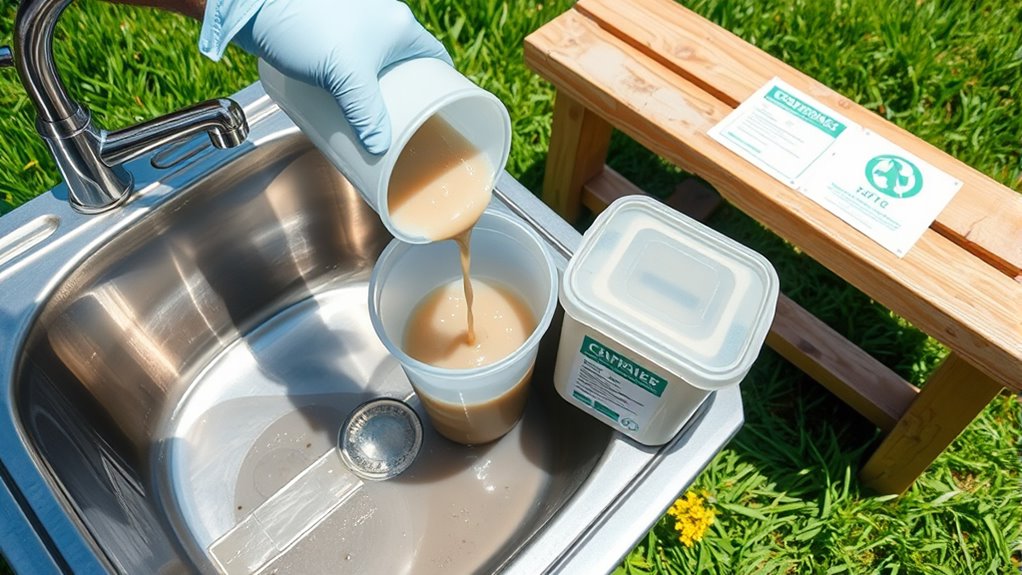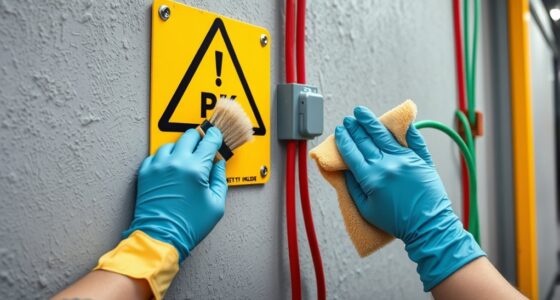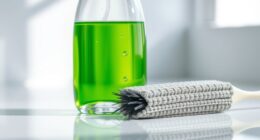To dispose of dirty water legally, you need to identify if the water contains hazardous chemicals, biological waste, or pollutants. For clean water, it’s usually safe to drain into your sewer system. For contaminated water, use proper treatment methods or seek professional waste disposal services. Avoid pouring anything into storm drains or natural bodies without permission, and be sure to follow local laws and regulations. Keep in mind, understanding these rules guarantees safe disposal—there’s more to learn about protecting the environment.
Key Takeaways
- Identify the type of contaminated water and determine if special treatment or disposal methods are required.
- Use proper filtration or chemical treatment to reduce pollutants before disposal.
- Consult local laws and regulations to ensure compliance with permits and disposal guidelines.
- Discharge clean water into authorized sewer systems, avoiding storm drains and natural water bodies without permission.
- For hazardous or heavily contaminated water, utilize licensed waste disposal services and obtain necessary approvals.

Disposing of water properly is essential to protect the environment and prevent health hazards. When you’re dealing with dirty or contaminated water, it’s important to follow proper procedures to ensure you’re engaging in legal disposal. One key step is understanding water filtration, which helps remove pollutants before disposal. Water filtration involves using specific devices or methods to clear out contaminants, making the water safer to handle or dispose of according to local regulations. Depending on the level of contamination, you might need to use specialized filters, chemical treatments, or biological methods to break down pollutants before disposal. This step not only reduces environmental impact but also guarantees you’re complying with legal standards.
Before disposing of any water, you should familiarize yourself with local laws and regulations regarding water disposal. Many jurisdictions have strict rules about how and where contaminated water can be released. For example, some areas prohibit pouring dirty water into storm drains or onto the ground because it can contaminate natural water sources or harm wildlife. You may need to coordinate with local waste management authorities or environmental agencies to get the proper permits and guidance. In some cases, you might be required to treat the water further or take it to designated disposal sites that accept contaminated fluids. Ignoring these legal requirements can lead to fines, legal action, or environmental damage.
If you’re disposing of water from household sources, such as from cleaning or laundry, it’s often safe to drain it into your sewer system, provided it doesn’t contain hazardous chemicals. However, water contaminated with chemicals, oils, or biological waste needs special handling. In such cases, you should consider professional disposal services that specialize in hazardous waste. They have the equipment and knowledge to manage the water safely and legally. Never pour contaminated water into natural water bodies or storm drains unless explicitly allowed by law, as this can cause water pollution and harm ecosystems. Additionally, understanding pollutant removal techniques can ensure the water is properly treated before disposal.
Frequently Asked Questions
Are There Specific Permits Required for Disposing of Contaminated Water?
Yes, you do need specific permits for disposing of contaminated water. You must verify permitting requirements based on your location, as disposal regulations vary by state and municipality. Typically, you’ll need to obtain permits from environmental agencies to ensure your disposal methods are legal and safe. Failing to adhere to these regulations can result in hefty fines or legal trouble, so always verify the proper permits before proceeding.
Can I Dispose of Dirty Water in My Household Sewer System?
You shouldn’t dispose of dirty water directly into your household sewer system without proper treatment. Water filtration can help remove contaminants, but sewage regulations often restrict what you can dispose of, especially if the water is contaminated. Check local laws and regulations first. If necessary, use approved disposal methods or contact waste management services to ensure you’re handling dirty water legally and safely.
What Are the Penalties for Illegal Water Disposal?
You could face fines up to $50,000 per day for illegal water disposal, highlighting how serious water pollution penalties are. Environmental fines are imposed to deter harmful practices that contaminate water sources. If you neglect legal disposal methods, you risk hefty consequences, damage to your reputation, and environmental harm. Staying compliant helps protect the environment and keeps you out of trouble with authorities, ensuring you avoid costly legal penalties.
How Do I Identify Hazardous Substances in Dirty Water?
You identify hazardous substances in dirty water by testing for chemical contaminants like heavy metals, pesticides, and solvents. Look for biological hazards such as bacteria, viruses, or algae. Use water testing kits or hire professionals to analyze samples. Pay attention to discolored water, foul odors, or floating debris, which may indicate dangerous biological hazards. Proper testing guarantees you handle and dispose of contaminated water safely and legally.
Are There Eco-Friendly Alternatives to Traditional Water Disposal Methods?
Think of eco-friendly treatment as giving your dirty water a second chance at life. You can explore water recycling systems that clean and reuse water, reducing waste. Eco-friendly alternatives like constructed wetlands or bioremediation use natural processes to treat water safely. These methods not only protect the environment but also conserve resources, making your water disposal more sustainable and responsible. Embracing these options helps you stay eco-conscious and compliant.
Conclusion
Now you know the proper, polite ways to dispose of dirty water, ensuring you’re environmentally responsible and legally compliant. By following these simple steps, you prevent pollution and protect your community. Remember, responsible disposal is about respecting nature and abiding by local laws. So, take care, stay conscientious, and clear the clutter responsibly. With mindful methods, you’ll master the art of clean, compliant water disposal—leaving a pristine planet for future generations.









